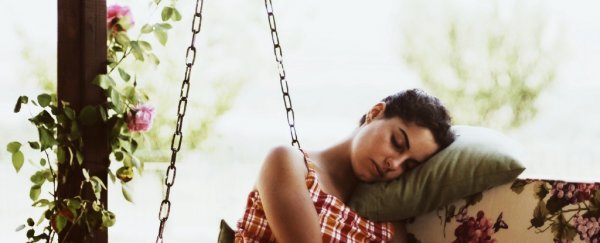If humans are truly capable of learning while we sleep, our noses might be the key. A new study on children suggests that subtle smells, like the fragrance of a rose, might help us to strengthen specific memories from the day.
Researchers in Germany found students were able to memorise new English words about 30 percent better when incense sticks were burned during study and sleep.
"Our study shows that we can make learning during sleep easier," says Jürgen Kornmeier from the University of Freiburg.
"And who would have thought that our nose could help considerably in this."
Since the 1950s, scientists have been fascinated by the idea of sleep-learning, known as hypnopedia. Traditionally, it's been thought to work via sound, such as listening to foreign language tapes while you fall asleep.
The thing is, this skill might not actually exist. Over the years, hypnopedia has gone in and out of favour with researchers, although recently there's been some evidence to suggest it's real - at least to some extent.
While you can't simply wake up having learned new facts and figures without consciously being aware of them, there's a thing called targeted memory reactivation (TMR) which might help solidify things you've already learned while you get some shut-eye.
Evidence in the past decade has shown that subtle sounds presented during sleep can strengthen memory processing, and several studies suggest odour cues can do the same.
In 2007, by presenting an odour along with a learning task, scientists were able to 'tag' certain memories with a smell and then prompt rehearsal of that information during sleep.
But there were only certain times when this tag was effective. During rapid eye movement sleep or wakefulness, re-exposure to the odour did not show the same brain activation as it did during slow wave sleep (SWS).
These findings and subsequent results suggest that during SWS, the hippocampus, which is involved in short-term memory, is reactivated, triggering the selection of content associated with an odour cue.
Most of these studies, however, have been done in highly controlled laboratory settings and not in real life situations. For instance, many researchers introduced the odour cue only during SWS, but this is impossible to pinpoint unless you are tracking brain activity with electrodes.
Thankfully, the new research has manged to gain some insights without this expensive equipment and unnatural settings. Researchers asked 54 German students in sixth grade to study English vocabulary at home with either a rose-scented incense stick on their desk and on their bedside table, or no incense at all.
Comparing those who were given scents to those who weren't, the authors found a noticeable difference, even outside the lab when the smell was continuous throughout the night.
"One particular finding beyond the seminal initial study was that the fragrance also works when it is present all night," says Kornmeier.
"This makes the findings suitable for everyday use."
Still, there are reasons to remain sceptical. The sample size of this study is small, and because it was conducted at home, there's more experimental "noise" in the findings than other research. For example, the smell's distance to a student's bed and desk was not controlled by the team.
What's more, there's also some evidence to suggest humans cannot really perceive that much smell and sound during sleep.
In 2018, researchers found that while patients could hear individual sounds while sleeping, there was no evidence they could actually group those sounds, which is needed for higher learning.
More research is needed, but even if perception is limited during shut-eye that doesn't mean all sleep-learning is off the table.
"We regard memory cueing during night together with its real-life applicability as highly promising for further basic research steps – perhaps with a higher degree of experimental control of field studies – and for easy application not only in educational contexts," the authors conclude.
The study was published in Scientific Reports.
